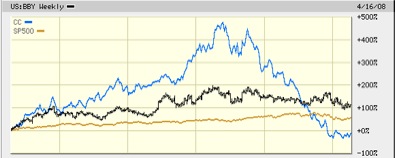Trust in Singapore
Greetings from Singapore.
The photo at left is of the Merlion, one of the city-state’s iconic statues—part lion, part mermaid. It’s a symbol of eclecticism—not “town of beans,” or “town by the bay,” or “city of light.” No, this is where water-spitting lion meets mermaid. Part land, part water; part fact, part fiction.
Singapore is part Malay, part Chinese, part Indian. Part open democracy, part tight governmental control. Part Western, part Eastern.
But all significant. Singapore’s population is only 4 and a half million. But it ranks number 9 in the world in foreign currency holdings. On a per capita basis, that dwarfs the other eight.
The Eurozone’s foreign currency holdings are about $3,000 per person. Japan is $15,000. But Singapore is $44,000 per capita. And you can double that if you include Temasek, Singapore’s quasi-Sovereign Wealth fund—a triple-A rated fund, one of whose smaller holdings is over 5% of Merrill Lynch with an option to go to just under 10%
In other words, a country on the move. And a fascinating example of diversity.
In my seminars on trust in business, there is always a discussion about whether trust varies culturally. Invariably, we rediscover that the core elements of trust are universal—but that their expression varies considerably.
The higher the diversity in the room, the higher the quality of discussion about this issue. Which is why discussions about trust in Singapore are among the best I encounter, and inevitably teach me a lot.
To live in Singapore, and to live in a large company with Asian presence, is to recognize the fact of interdependence in the emerging world economy. Your co-workers are Malays, Chinese, Indian; Muslim, Hindu, Christian; Indonesian, Pakistani, Thai, Australian. Where you go to lunch can be a cultural and religious decision. So a discussion of trust is a broad conversation indeed.
Is trust important to the Chinese? Sure, if you mean the cultural ritual of getting to know you before making business decisions. No, if you mean the suspicion that is the legacy of corrupt communist government in modern mainland China.
Is credibility an important part of trust in Asia? Sure, if you mean who you know. Not so much, if you mean technical expertise. Unless you got that expertise at a highly credible institution. Though of course on the other hand…
And so on. These discussions force us to higher levels of abstraction, in order to make sense of our daily interactions.
Here’s what I come away with. There is a universal human and social drive for connection—it manifests personally, politically, commercially, religiously, romantically, and tribally. It is reflected in political alliances, commercial ventures, etiquette, and modes of dispute resolution. All cultures and people need to express disagreement, for example. Just be careful when using Dutch approaches to disagreement in Tokyo, for example.
Arrayed against this drive are the forces and circumstances of fear, poverty, ignorance, custom, history, and xenophobia.
The conflict between the two manifests in aggression, suspicion, and—in business—an ideology based on the concept of competition.
The fundamental shift in the business world today is a move from competition toward commerce. From competing against your customers to collaborating with them. From getting over on others to getting along with them. From the replacement of contracts by trust as a means of mitigating business risk.
Asia has a lot to teach the West about the power of getting along. From reliance on contracts to the use of trust to mitigate business risk. Asia has a lot to teach the West about the power of getting along. Economically it beats the hell out of competing with each other.
Singapore is visceral evidence of that.

 You may know your IQ (Intelligence Quotient). You have some sense of your EQ (Emotional Intelligence).
You may know your IQ (Intelligence Quotient). You have some sense of your EQ (Emotional Intelligence).